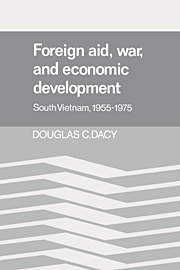Book contents
- Frontmatter
- Contents
- List of figures
- List of tables
- Preface
- 1 The rise and fall of the economy
- 2 U.S. aid to Vietnam: goals and programming
- 3 The growth of national income
- 4 Indicators of economic development
- 5 Land reform and income distribution in Vietnam economic development
- 6 Domestic saving, foreign aid, and economic development
- 7 Wartime inflation
- 8 Windfall gains from importing
- 9 The international value of the piaster
- 10 Vietnam foreign assistance
- 11 Financing public expenditures
- 12 The fiscal dilemma
- 13 Foreign aid and economic development in an environment of high military threat
- Notes
- References
- Index
12 - The fiscal dilemma
Published online by Cambridge University Press: 11 September 2009
- Frontmatter
- Contents
- List of figures
- List of tables
- Preface
- 1 The rise and fall of the economy
- 2 U.S. aid to Vietnam: goals and programming
- 3 The growth of national income
- 4 Indicators of economic development
- 5 Land reform and income distribution in Vietnam economic development
- 6 Domestic saving, foreign aid, and economic development
- 7 Wartime inflation
- 8 Windfall gains from importing
- 9 The international value of the piaster
- 10 Vietnam foreign assistance
- 11 Financing public expenditures
- 12 The fiscal dilemma
- 13 Foreign aid and economic development in an environment of high military threat
- Notes
- References
- Index
Summary
As relations between the two Vietnams grew increasingly hostile, a major fiscal problem in the South became its chief dilemma. Fiscal and other unpopular measures in self-reliance, it was thought, would alienate the population in the short run and reduce the probability of survival of the government. Yet, postponement of those measures would cause more serious problems eventually, because self-reliance is essential to economic development and viability of democratic governments in the long run. The options open to the Vietnamese government were to make the first move toward self-reliance, and then proceed step by step, or to become more and more dependent on aid. Both appeared to be risky and unpromising.
In the late 1950s and early 1960s, South Vietnam was a relatively poor country. Though almost self-sufficient in food, it had a large trade deficit that it was able to manage thanks to U.S. aid. The country had a poor central administration, with little skill or motivation to cope with internal financial problems. The internal war in the early sixties, and later the external war, brought insecurity to the countryside, along with a siphoning of manpower and other resources to military operations.
- Type
- Chapter
- Information
- Foreign Aid, War, and Economic DevelopmentSouth Vietnam, 1955–1975, pp. 231 - 239Publisher: Cambridge University PressPrint publication year: 1986



